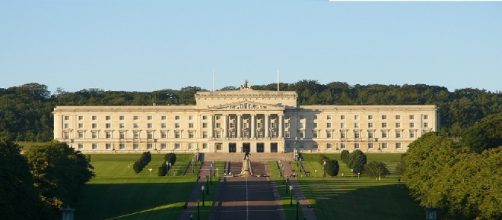Three IRA terrorists have been exposed for threatening the ongoing Northern Ireland talks process at Stormont.
Pro-British publication Unionist Voice has revealed the identities of three senior Irish republicans haunting the Northern Ireland Assembly's corridors and wielding a veto over the talks process. Their names are Bobby Storey, Martin Lynch and Sean Murray.
The three terrorists were crucial during the IRA meeting in the Felons club where they urged Ulster's largest nationalist party, Sinn Fein, to adopt a tougher position ready for the talks.
Because of this terrorist group's order, the IRA trio were appointed to guard Sinn Fein and have a veto on any decisions they made.
The IRA Council influences Sinn Fein's direction
The accuracy of a Government assessment conducted in 2015, which stated the IRA Council influenced Sinn Fein's direction, has been proven to be accurate as a result of their veto over the nationalist party's decisions.
Mr. Storey was a member of an IRA gang that escaped from the Maze prison in 1983. In 2015, he was arrested following the IRA's murder of their former activist, Kevin McGuigan.
Mr. Lynch is the IRA's Chief of Staff. He is a longstanding member of the IRA Council.
Mr. Murray has been the middle man between Sinn Fein and the Army Council for numerous years.
He conducted a sophisticated gun-smuggling operation during the original peace process. He occupied the position of Northern Commander when the IRA inflicted some of its worst terrorist attacks on Northern Ireland.
The Government is flirting with the idea of reimposing direct rule on Ulster
The news comes as the Government has decided to reimpose direct rule on Ulster for the first time since 2007, when the Democratic Unionist Party's (DUP) leader Ian Paisley and Sinn Fein's Martin McGuinness agreed to form a power-sharing coalition.
Northern Ireland Secretary James Brokenshire said Westminster will impose a budget on Ulster after attempts to form a power-sharing agreement between Ulster's two largest parties collapsed.
People in the province worry direct rule would threaten the political balance between the DUP and SInn Fein, which has already been affected by Brexit.
Prime Minister Theresa May's minority administration is dependent on DUP votes to pass legislation. Any move to appease the nationalists could impact upon the Conservatives' ability to hold power.
Sinn Fein pulled out of its ten-year coalition with the unionists in January, complaining his party was not being treated like an equal partner.
Michelle O'Neill said she was disappointed the negotiations ended in failure
The party's leader in the province, Michelle O'Neill, told journalists she was disappointed that the negotiations ended in failure.
The DUP finally agreed to share power with Sinn Fein in 2007 as a result of Northern Ireland's largest unionist party pressuring both the British and Irish governments of the time to persuade the IRA to completely disband their weapons, which they did in 2005.
The DUP overtook the Ulster Unionist Party (UUP) as Northern Ireland's largest unionist party during the Assembly elections in 2003 and in Westminster during the 2005 General Election. This was because UUP leader David Trimble formed a power-sharing coalition with the Social Democratic and Labour Party and Sinn Fein in 1999 whilst the IRA were disbanding their weapons.
Ian Paisley refused to enter into a coalition with any unionist or nationalist party due to the IRA's failure to disband all of their weapons before entering such an agreement.
The original power-sharing agreement drawn up after the 1998 Good Friday Agreement collapsed in 2002 when Mr. Trimble pulled his party out of it. This was because Sinn Fein workers at Stormont were using the Assembly building to gather intelligence.
Prime ministers Tony Blair and Bertie Ahern of Britain and Ireland respectively then helped draw up the St. Andrew's Agreement of 2006, which was seen as a revision of the terms laid out in the 1998 Good Friday Agreement. This was after the IRA surrendered their weapons and the DUP became open to the idea of governing with the nationalists.

